Changzhou Revolutionary Song Troupe leader Dai Cheng has been to the birthplace of Mao Zedong in Hunan province "countless times."
The museum at Shaoshan is traditionally a focal point for celebrations of Mao's birthday on Dec. 26, and Dai often takes his choir there to fill the air with rousing revolutionary songs, sometimes holding an all-night vigil for his political hero.
"Six or seven years ago, for three consecutive years, we stayed up from Dec. 25 to sunrise on the 26th, ringing in the New Year with a vigil for Chairman Mao," Dai told Radio Free Asia in a recent interview.
"The festive atmosphere in Shaoshan is indescribable," he said. "Even in the middle of the night, there's a constant flow of people. It's incredibly moving."
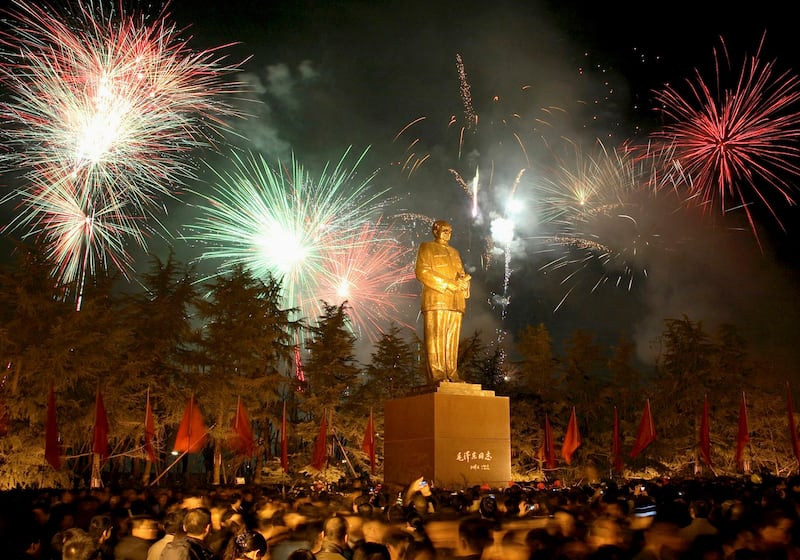
As China marks the 130th anniversary of Mao's birth, the late Chairman is enjoying a political resurgence alongside the cult of personality surrounding incumbent Chinese Communist Party leader Xi Jinping.
Revered by many as a demigod when he was still alive, Mao's political reputation waned considerably during the economic reform era of his successor, Deng Xiaoping.
Yet the revolutionary praise culture of the early decades of the People's Republic of China has lived on in the popular imagination long after the Great Helmsman's death, embraced above all by China's legions of Mao fans.
"Various factors contribute to Mao fandom," U.S.-based political commentator Hu Ping said. "Some are dissatisfied with the current state of affairs, the proliferation of capitalism, wealth disparity and the unchecked power of the elite.
"They view the Mao era through a nostalgic lens and use Mao's image to critique the present," he said.
A loyal follower
Asked if he identified as a "Mao fan," Dai was dismissive, saying: "I'm aware of its meaning, but I can't be bothered with it. All I know is that I'm a soldier of Chairman Mao – a loyal follower of communism."
Dai doesn't believe that the Mao era – which spanned the political violence of the land reforms and Anti-Rightist Campaigns to the mass starvation that followed the disastrous Great Leap Forward, the Cultural Revolution and the Gang of Four – should be dismissed simply as a time when everyone was as poor as the next person.
"Its most essential characteristic was fairness, which ensured security for all," he said, blaming the problems China faces today on its divergence from the "true path" of Maoist ideology.
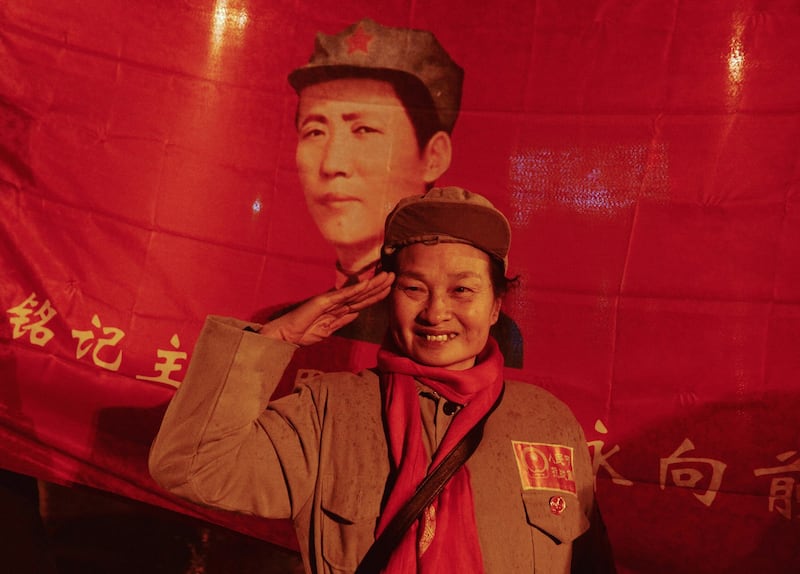
There are reasons why Dai is such a true believer – his poverty-stricken background, for one.
"From a young age, my mother would tell me that my father, at the age of eight or nine, used to herd cattle barefoot in the snow for the landlords," he said.
"I was born into a poor family. My father joined the revolution at the age of 19," he said. "We inherited communism; we were taught to emulate [model worker] Lei Feng and do good deeds. Communist education and ideology laid the foundation for our thinking.”
Dai became an active Red Guard at the age of 13, although he ended up in an anti-Mao faction without realizing who they were. He later switched sides to a Maoist faction, but still feels guilty to this day.
Mao’s reputational hit
According to Hu Ping, most ordinary Chinese people thought the same way back then, unquestioningly obeying Mao and striving to be his "good soldiers."
But once Deng Xiaoping launched his program of economic reforms in 1979, people started to criticize the cult of personality around their late leader amid a newfound atmosphere of political liberalism, he said.
"In the 1980s, the Chinese Communist Party passed resolutions on historical issues dating back to the founding of the People's Republic of China," Hu said. "Back then, most intellectuals, ordinary people and even high-ranking Communist Party members held a negative view of Mao Zedong and called for a more thorough denunciation.
"It was only Deng Xiaoping who gave a more positive evaluation, taking into account the political situation at the time," he said. "A lot of people believed this was temporary and that a more negative assessment would follow."
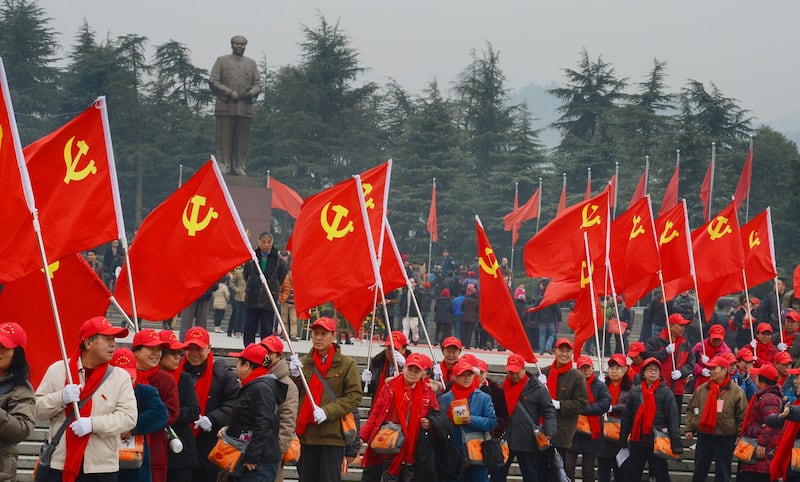
In the 1970s, Dai Cheng worked in a factory, involved in propaganda activities related to revolutionary arts and literature. In 1980, he was transferred from the factory to the local Machinery Industry Bureau, and in 1984, he joined the Changzhou Municipal Urban Management Team.
It was during the 1980s that things started to go wrong, according to Dai.
"The party began to deviate from its original mission, and it started to distance itself from the people," he said. "The communist education and faith we grew up with began to be abandoned ... and the concerns of ordinary people were increasingly disregarded."
Around that time, Mao's former residence in Shaoshan was seeing a big decline in visitors, while any public admiration for Mao focused on his political skills and his literary and calligraphic talents. His image simultaneously gained an iconic status as a protective talisman or a symbol of good luck.
"At that time, the reverence for Mao Zedong was fundamentally different from the way it was during the Cultural Revolution," Hu said. "He was seen as a kind of mythical figure, an extraordinary figure who faced numerous risks in his lifetime, yet managed to live to a ripe old age.
"So, people believed he could bless them and keep them safe. They elevated Mao to a quasi-divine status," he said.
Elevated once more
The critical atmosphere – which had come along with the more liberal political atmosphere of the 1980s – tailed off after the 1989 Tiananmen massacre and the ideological crackdown that followed, Hu said.
"The Tiananmen massacre wasn't only aimed at the protesters in the square; it was a crackdown on anyone supporting ideological liberation, liberalization and democratization in the 1980s," Hu said. "Criticism of Mao Zedong was part of that liberalization ... so when it was suppressed, it was only natural that criticism and negation of Mao's legacy were suppressed too.
"The ideological climate underwent a total transformation," Hu said.
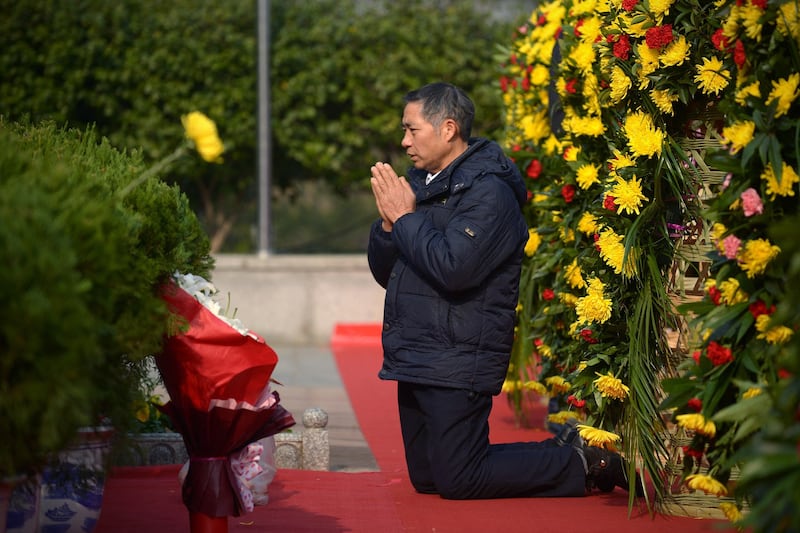
Since then, the pendulum has swung back again, and Mao's image has been used by those in power to further their own political agendas.
In 2008, the singing of "red" revolutionary songs by hobby groups was picked up and encouraged by Chongqing Municipal Party Secretary Bo Xilai, whose jailing for corruption came as a top official reported a foiled coup plot.
Mao's political afterlife has also been extended by Xi Jinping, who regularly makes pilgrimages to revolutionary sites in a bid to sell his own ideology as a return to a simpler time, when there was less of a gap between rich and poor, and less official corruption – or so the myth about Mao goes.
Yet while Xi has been accused of trying to become the next Mao, the government also fears Mao and his devotees, concerned that the Chairman's mythologized image could provide a focal point for serious opposition to the status quo.
In recent years, it has cracked down on Maoist websites and on young leftists who campaign for workers rights.
"People like [labor activist] Yue Xin at Peking University supported workers' rights, putting them into the category of Maoists," Hu said. "This faction has been consistently suppressed by the authorities.
"While the authorities have elevated Mao's status again, they are also extremely wary of individuals who use Mao to criticize the current regime," he said. "There is an internal understanding that the authorities staunchly suppress anyone who uses Mao Zedong's image to oppose the contemporary Communist Party."
Singing as activism
When Dai spoke to Radio Free Asia, he was busy rehearsing his choir for a performance marking Mao's 130th anniversary.
The choir isn't just a bit of fun, either. All of its members are staunch followers of Mao who mean every word of revolutionary songs, like "Sailing the Seas Depends on the Helmsman" and "The Sun Is Reddest When Chairman Mao Is Closest."
It offers its members a vision of a simpler life in which everyone is provided for.
"Chairman Mao's Communist Party provided workers with secure jobs, but later, these were taken away." Dai said. "Today, young people don't want to get married. Why? Because they can't afford a home. Isn't this a threat to their livelihood? If they can't afford a home, how can our nation develop? Nowadays, food safety is a big issue, and there is disease everywhere, yet people can't afford medical treatment."
Dai started the troupe during the "red song" craze of 1993 sparked by Mao's centenary, in a bid to push back against the tide of pop music from Hong Kong and Taiwan and other examples of bourgeois culture.
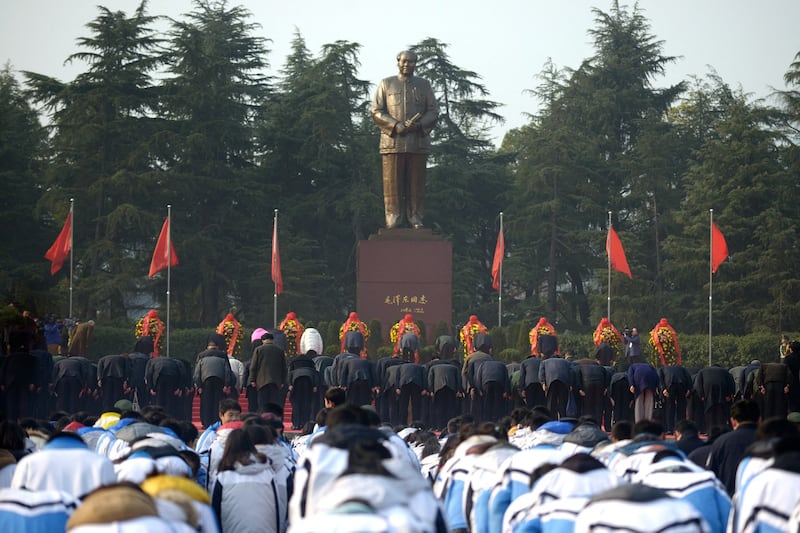
For Dai, the singing of "red songs" is a form of political activism.
"We suddenly realized that singing was a form of struggle, a means of expression, and an ideology," he said. "It was an effective and legitimate way to carry out this struggle."
There is also a strong sense of community, and Dai has extended financial help to at least one member going through hard times.
"Mao fans are definitely people with strong moral values," choir member Huang Yi said. "They are trustworthy, at the very least, they have aspirations, and they want fairness and justice."
Dai has invested everything in his choir, ever since selling his home to finance taking part in a choral competition in 2002 in Beijing, footing the bill for some 100 members over a 10-day period.
His passion for "red songs" has left him more than 2.4 million yuan ($336,000) in debt, with 400,000 yuan still outstanding, and has at times seen him estranged from his wife, sleeping in his car and missing his mother's funeral.
Targeted by police for starting a Mao Zedong study group yet still unbowed, Dai wants to take the choir global.
"Give me a billion, and I'll take red songs global," he said. "I'll sing them all over the world."
Translated by Luisetta Mudie . Edited by Jim Snyder.
